By Kenney kost/managing editor
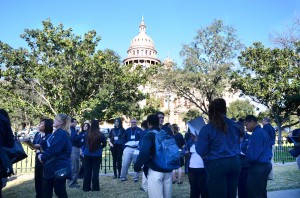
A group of 46 TCC students joined about 1,500 other community college students Feb. 5 on the steps of the Capitol in Austin making their voices heard to the legislators inside.“Let them know you’re here,” speaker after speaker told the group during opening remarks at Community College Day at the Capitol.
Students traveled to Austin to view the floor process and speak one-on-one with House and Senate legislators to express concerns regarding legislation for community colleges.
“Sometimes we get tired and frustrated as we try to promote and advocate for
community colleges,” said Bill Holda, Texas Association of Community Colleges board chair. “But seeing you, the students, faculty, staff, sponsors, administrators and trustees, it really reaffirms what we believe in and that to which we advocate, which is — you are the future of this state.”
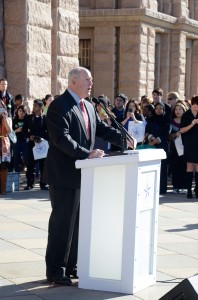
They were urged to participate in every aspect of the day and to share with legislators any concerns they might have for the upcoming session.
“Almost every senator here has a community college in their district,” said state Sen. Kel Seliger, R-Amarillo. “You are the cornerstone of our workforce and future of the economy in the state of Texas. You have an obligation to see to it that the community college system stays as strong in the future as it is today. There are a lot of us in the building who want to help you.”
Seliger said the message should be that of the $180 billion to be spent over the next two years, the biggest investment is in community colleges.
Ashley Scholton, president of the Texas Junior College Student Government Association, also urged students to voice their concerns on issues like the formula used to fund schools and concealed handguns on campuses.
“There are many points that need to be covered within several different bills
that have been proposed for this biennium,” she said. “We urge those of you in attendance today to thoroughly voice your concerns through productive conversations with your elected officials.”
Rep. Dennis Bonnen, R-Angleton, said community colleges are the center of every community, not only educationally but also culturally and by driving the overall community.
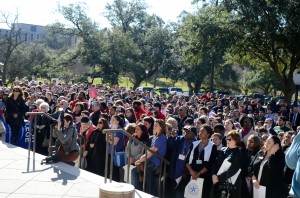
Below: TCC SGA members and other students were some of the 1,500 community college students who traveled to Austin. Photos by Georgia Phillips/The Collegian
“Community colleges drive workforce development and provide opportunities in the community that can’t be provided elsewhere,” he said. “So don’t let anyone sell you or your community colleges short.”
Students, faculty and administrators wasted no time rushing the Capitol to get to appointments with representatives and to view the action on the House and Senate floors.
TCC communication and external affairs vice chancellor Reginald Gates said the turnout was important, not only for community colleges in Texas but also for legislators and students.
Students had varying reasons why they took the trip to Austin. Some had in-depth questions for their legislators while others took advantage of their first trip to the Capitol.
NE student Kyle Weatherred said this was his third trip to the Capitol, and he decided to seize the opportunity for face-to-face time with legislators.
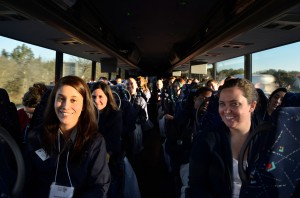
“I’m going to talk to the representatives about how community colleges offer key programs that not only help
students academically but also socially, both professional and non-
professional programs,” he said, “And why they are key programs that help people in their undergraduate years and will help them significantly later in life and why those are important.”
NE student Mark Mikende said he just wanted to see the Capitol and gain an understanding of how the process works.
“I wanted to experience the city and the Capitol and the epicenter of Texas politics,” he said.
South student Travis Larson said he has always been interested in politics and has been to the Capitol a few times.
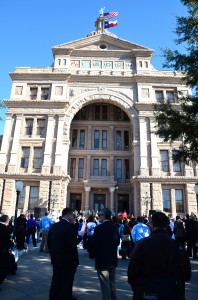
“We got to see the Senate and go on a tour, but it wasn’t quite as extensive as this,” he said. “I will probably discuss something having to do with immigration reform because that’s a big issue in current politics. And Texas is a border state, so it’s very important in this state in particular.”
TCC alumna and state Sen. Wendy Davis, D-Fort Worth, met with students in a busy hall between her office and the Senate floor. She answered questions regarding employment after graduation, financial concerns and whether student governments should tax their students and use the money to help lower tuition rates.
“The best thing to do is for colleges to work with employers in aligning degree programs to specific needs that exist within the community,” she said. “I know TCC has worked with employers in Tarrant County, but I’m not sure it’s occurring statewide in the way that it needs to.”
Davis said the proposed state budget has another 6 percent cut that she thinks is “just insane” when people step back and realize what community colleges do for Texas communities and the workforce.
“It’s coming at a time when the Texas Grant Program continues to be a fund that just allows a greater and greater number of students to go to universities, so it’s just out of whack,” she said. “But I’m hearing good things. I think they have been sufficiently chastised about the 6 percent cut. And hopefully, we’ll see that come out of the final budget.”
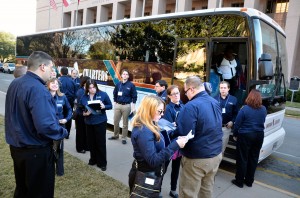
Davis and other colleagues have been looking into solutions for getting more money into the hands of college students and have proposed looking at the state’s tax exemptions to see which are still needed.
“We are literally giving away billions of dollars in those sorts of exemptions and loopholes,” Davis said.
Rep. Diane Patrick, R-Arlington, a former professor at the University of Texas at Arlington, met with a group of students who discussed concerns like financial aid continuation for non-traditional students and the issue of students being unprepared for college because of standardized testing in Texas public schools. She said legislators should take non-traditional students more into account.
“The majority of the students in the situations we are describing are working 40 hours or more. They have families, etc.,” Patrick said. “I have been a strong proponent of taking that into consideration. Don’t say that every student across the state is the same.”
Patrick and her colleagues are developing a metric that considers the fact that students, regardless of time frame, are staying on a path to completion and should not be penalized.
“I can just simply say to you that in terms of holding a two-year institution accountable based on graduation rates is not fair to the reality of the situation,” she said. “Last year was difficult because we had a $27 billion deficit. So many things got zeroed out. We were able to restore some of that. We need to restore all of that.”
Sen. Alfonso Navarez, D-Eagle Pass, told students in a crowded lobby just outside the Senate floor that it was up to them to hold their members accountable. Each individual college or university should decide whether to allow concealed handguns on campuses, he said.
“People are waiting to see how we are going to react to this surplus in the budget. You know, are we going to restore these cuts or not?” he said. “You should hold your members accountable when the smoke clears in six months. Look at the way they voted on it, and that’s how you decide if you have a good member or not — whether that member voted on restoring the cuts or not.”
He said the legislature should not be making decisions on gun control. Instead, the individual schools and systems should.
“I’m a gun owner,” he said. “I’ve got rifles and pistols, but I don’t want to shove that down anyone’s throat. And as a parent, I’ve got an issue with sending my kids to a place where everyone is going to be heavily armed all the time. I just do.”
While students said the experience was great, most felt the legislators could have been more generous with their time. They also had skepticism whether the candidates were simply paying lip service to them or showing genuine concern for their issues.
“It would have been nice to have a little more time with the senators and representatives,” said TR student Alysha Osborne. “As far as what they have in mind for us is still a little bit up in the air.”
NE student Mystika Daigneault said she wasn’t very impressed with her visit.
“It went good, but like everyone else, I wasn’t impressed with the way some things were handled and the visit with [Sen.] Kelly Hancock [R-North Richland Hills],” she said. “I have their cards, and I will send emails, not sure about everything I will ask, but I want to try to get some information in there and see what kind of response I get.”
Osborne shared the sentiments and urged other students to do the same.
“It’s time for mass letters and emails,” she said. “Bombard their inboxes and mailboxes and phone lines and just make them listen.”





















